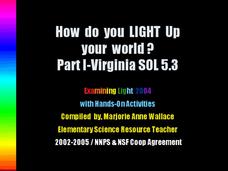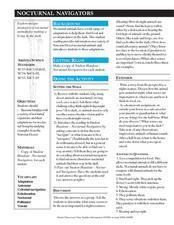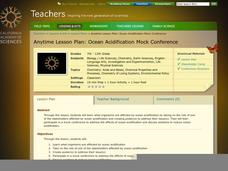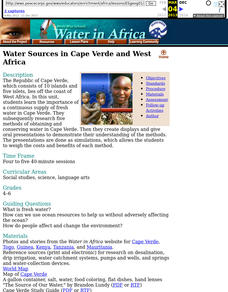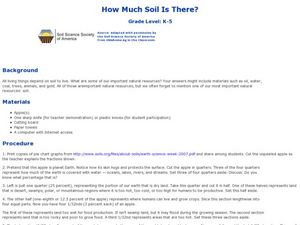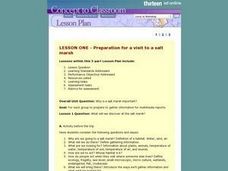Curated OER
Science
Learners study God's plan and how it works in the universe. This is a religious lesson where pupils divide into groups. Each person is assigned a job within the group, such as researcher, visual presenter, oral presenter, or writer. They...
Captain Planet Foundation
Sorting Out Soils
Sift through soil and learn about why it's important for organic processes. After discussing what makes up soil, such as the living organisms and what types of soil have more nutrients, kids sample layers of mulch and deeper soil to...
Curated OER
How Do You Light Up Your World?
A fabulous presentation on light is here for you. In it, learners view slides which cover many important concepts of light. They understand exactly what light is, what the main sources of light are, what opaque, transparent, and...
Curated OER
Fossil Kit I - Lesson Plan
Here is a 14-page lesson plan that deftly outlines a wonderful educational experience for your youngsters. In it, students learn about a variety of animals that have left behind clues of their existence in fossil form. Many excellent...
Desert Discoveries
Nocturnal Navigators
Young biologists take a look at some of the unique ways that nocturnal animals survive in the dark. After reading a terrific student handout which is embedded in the plan, learners work together to answer questions about what they have...
Curated OER
Safety Comes First
Here is a thorough lesson on safety in the chemistry lab. Chemists review a detailed list of safety rules, draw the layout of the laboratory area to include emergency equipment, identify hazard warnings, and consult the MSDS in order to...
NASA
Einstein's Gravity
Assist your high school class with researching and applying the principles of gravity so they may further understand why Einstein is so widely recognized, even today. Individuals compare and contrast two different models that demonstrate...
Curated OER
X-ray Spectroscopy and the Chemistry of Supernova Remnants
This link takes you to a comprehensive unit that delves into emission spectra and supernovas. There are four parts: How and where elements are created, electromagnetic radiation, spectroscopy, and the newest technology for studying our...
Curated OER
Human Body Series - Cardiovascular System
Pump up your class while studying the cardiovascular system with this pair of activities. In one, learners record heart rates during different actions. In the second, they read kid-friendly heart health articles online and then write a...
Baylor College
Serving Sizes
Are serving sizes for different foods always appropriate for what you need? In this hands-on activity, learners work in groups to estimate what one serving size of various foods are, and then evaluate their hypotheses by measuring...
Curated OER
Fish Communities in the Hudson
Learning to read data tables is an important skill. Use this resource for your third, fourth, or fifth graders. Learners will will study tables of fish collection data to draw conclusions. The data is based on fish environments in the...
Alabama Learning Exchange
Make a Difference!
We are very dependent upon other life forms around us to survive. Here, scholars explore relationships in the ecosystem with the help of Auntie Litter and the pollution patrol. They imagine a world without grass, making connections to...
California Academy of Science
Ocean Acidification Mock Conference
In a comprehensive role playing activity, teens play the parts of different stakeholders in the realm of acidic oceans. They research, debate, and create a presentation from the perspective of either ocean organisms, the fishing...
Curated OER
Water Sources in Cape Verde and West Africa
Young explorers study the scarcity and importance of a continuous supply of fresh water in Cape Verde. They research the five main ways that fresh water is obtained in these countries. Each research group prepares a presentation, and...
Curated OER
Raven Chapter 12 Guided Notes: Sexual Reproduction & Meiosis
Young biologists define reproduction vocabulary terms, answer critical-thinking questions, label a diagram of the human life cycle, and complete a chart comparing mitosis to meiosis. This is a well-balanced instructional activity. Even...
Curated OER
Water: Our Most Important Beverage
Third graders complete a KWL chart on what they already know about water and what they want to know. As a class, they participate in an activity in which they discover the amount of drinkable water on Earth and are introduced to the...
Curated OER
Science in the Garden
Young scholars examine soil from their local environment. In this garden activity, students recognize the importance of soil in the garden. Young scholars explore the contents of the local soil.
Curated OER
Shark Attack Odds and the Importance of Sharks
Students examine an ecosystem. In this food web lesson, students discover the importance of sharks and what threat sharks actually pose to humans. They participate in class discussions and work independently on a couple of different...
Curated OER
The Importance of Detailed Procedures in Science
Students examine the importance of clear communication in scientific exploration. In pairs, they write clear directions for an everyday activity for their partner to read and follow.
Curated OER
How Much Soil is There?
Students examine that all living things depend on soil to live. For this science lesson, students pretend that an apple is planet Earth. Students cut the apple to represent the portions of Earth with the last section representing soil.
Curated OER
4-H Food Science Activity Page- Life Skill- Healthy Lifestyle Choices
In this 4-H food science worksheet set, student investigate safe food handling procedures, create a recipe to share, identify the types of meats that are found at their local grocery store, and identify five dairy products. They complete...
Curated OER
Where is Agriculture?
Students explore agriculture. In this agriculture lesson, students read "Where is Agriculture?" and discuss all the things that come from agriculture. Students discuss what they need to survive and give examples of agricultural products...
Curated OER
Using Dialogue Journals in Support of Science Instruction
Students build a dialog journal within their science class. They develop written responses to questions asked by the teacher in a journal notebook. Teachers have the responsibility to read and respond to student responses.
Curated OER
Why is a salt marsh important?
Students discuss the salt marsh. They define the following terms: habitat, water, land and air. Students work in small groups. They are asked why are they going to a salt marsh? Students discuss whose habitat is it at the salt marsh.


